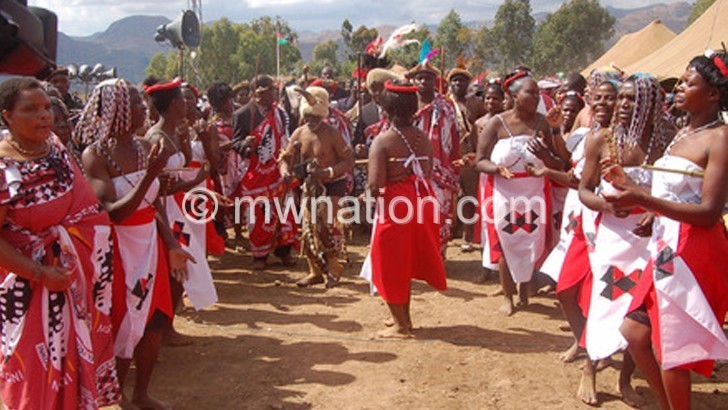The year when cultural festivals ruled
To say that year 2019 was no ordinary year would have been debatable if it were not for several cultural festivals.
Festivals such as Mulhako wa Ahlomwe and Umhlangano wa Maseko have become the annual fixtures, but have been joined by several others.

Looking back, one can safely conclude that almost all cultural groups held their annual festivals.
What is memorable is the pomp with which the festivals were conducted. Also throughout the year, those behind the running of these cultural groupings ensured that the associations are active.
It all started in January when Yaos announced their intentions to launch their association called Chiwanja Cha a Yao. This was after failing to do so for years. Months later, after several postponement, the event took place. The launch doubled as its first annual cultural festival.
What followed was a flurry of cultural festivals. Mulhako wa Ahlomwe lead in as far as pomp and patronage is concerned.
The event took place on October 11-13 at Chonde, the group’s headquarters in Mulanje. It was a grand affair, where exhibitions of the Lhomwe beliefs, practices and traditions were out for all to see and enjoy.
The 2019 festival was the 12th edition of the Muhlako wa Ahlomwe. It reached the climax on Sunday October 13 when traditional dances, traditional foods and of course traditional aphrodisiacs were on full display for patrons to sample and enjoy.
This year, like has been the case in previous years, it was the aphrodisiacs that took centre stage.
Leston Mulli, this year’s organising chairperson said: “I am no longer as energetic as I used to be. But I am going around with my jeke,[carjack] to be energetic.”
His sentiments were echoed by scores of both modern and rural people who were seen trying out several aphrodisiacs on sale and display. Clearly everyone had a good time.
Not to be outdone, within the year, the Jere Ngonis of Mzimba held their annual Umthetho Cultural Festival at the foot of Hora mountain on August 10. As usual, the event was colourful, characterised by workshops for the youth, women and men on leadership and other matters affecting their day to day lives.
“I want to ask all Ngonis to be responsible whenever we are preserving our heritage. We are living in an era where HIV and Aids is claiming lives of many people. So, despite our Ngoni culture allowing men to practise polygamy, we should also be mindful of the HIV and Aids challenge among us,” said Paramount Chief Mmbelwa, head of the Jere Ngonis in Malawi.
For Tumbukas, in the northern region of Malawi they had both bitter and sweet news when it came to the cultural festivals this year. Following the death of Chief Chikulamayembe, a fierce battle erupted as to the selection of the heir. One group went to the court to sort an injunction stopping the annual Gonapamuhanya cultural ceremony from being observed.
However, this development led to the birth of two new cultural festivals —Mulindafya and Mkuramchere.
“Mulindafya is celebrated every first Saturday of September in honour of Mulindafya, the grandfather of the Katumbi dynasty who alongside his clan trekked from Egypt through Tanzania to Malawi,” said Senior Chief Katumbi.
He said Mkulamchere on the other hand, is celebrated after Sulumphale Msowoya, the first occupant of the Henga Valley, who alongside Mkhulikuli , Mzumara and Kango Nyirongo used to mine salt around the place.
The events took place on September 7 at Hewe, the Katumbi headquarters.
Tongas did not want to watch others without jumping in with their own as they also had their cultural festival on August 17. At the annual festival held under the theme ‘Our Unity, Our Strength’, the group among other things, honoured 15 outstanding individuals of Tonga origin for their selfless and dedicated service to Malawi.
In the central region, Chewas under Chewa Heritage Foundation (Chefo) have continued to be active in their quest to promote the Chewa culture.
This year the annual Kulamba ceremony, again, took place at Mkaika in Zambia where traditional dances, foods, and dressing were promoted.
In September 2019, Malawi, however, welcomed a new cultural grouping Bwalo la Achewa.
The new group, rivalled Chefo. The leadership of the group insisted that it came to be the national Chewa grouping, insisting that Chefo is international as it has membership in Zambia, Mozambique and Malawi.
The event took place at Dowa Community Ground under the theme ‘Chewas and Nationalism for Sustainable Development of Malawi.
And while all cultural groups had straight up events, it was the Umhlangano cultural event that received the most attention. It was bundled together with the wedding of Inkosi ya Makosi Gomani V.
The event took place on November 1 and 2 at Mkolimbo in Ntcheu.
“We have offered sacrifices at the grave of Chikuse Gomani 1 so that his spirit should continue being with us,” said Inkosi Makwangwala, one of the organisers of the ceremony.
So, as they year ended, it was clear that leaders of traditional groups in country are not sleeping on the job. They are doing everything they can to claim their place.





